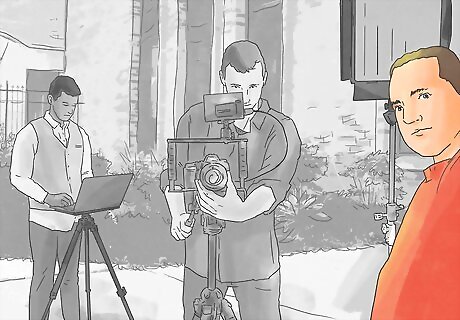
views
Getting the Right Education

Take a film class or enroll in film school. Not only will you learn a lot about the craft, but you will also make connections with others that are interested in making movies. You may even be able to find work on a film crew through your classmates or professors. Many community colleges offer courses in film that you could sign up for if you aren’t ready to enroll in film school.

Study writing, theatre, art, or another related field. People on film crews sometimes have varied backgrounds, such as in writing, theatre, or art. Consider taking classes in these subjects to broaden your knowledge and prepare you for becoming a filmmaker.

Research films. You should watch a variety of movies to get ideas and tips for your own film. Choose movies from different genres and different eras. Pay attention to details such as: What do you like about a film? What makes a movie believable? What makes a strong character? How are props used successfully? How does the location impact or enhance the film?

Find out what’s going on in the industry. It is important to keep your knowledge current regarding the market. Find out news and trends about the film industry so that you know what you’re up against.

Network. Meeting other people in the industry can help you out tremendously. Follow leaders in the filmmaking biz on social media, and attend filmmaking and movie events as often as you can.

Find a mentor. Speak to someone who has experience with filmmaking. Ask them what tips or tricks they have for you. Ask to tag along when they shoot one of their own movies so you can see firsthand what works and what doesn’t. You may be able to find a mentor in film school. Ask a classmate who has experience or one of your professors to mentor you. Alternatively, once you gain experience on a film crew, you may be able to find a mentor through your work.
Gaining Filmmaking Experience

Join a film crew. In order to gain experience in the industry, you should work on a film crew. Search online for job openings near you, and ask your classmates and professors if they know of any crews seeking help.

Sign up as an assistant producer to learn how a production works. The producer can help choose other members for the film crew as well as cast the roles for the movie. This person manages the production from start to finish. They are the group leader and the one who develops the project. You will likely need education as well as experience to qualify for a producer role, but as a beginner you can likely be a production assistant.

Assist the director if you want to be at the center of film production. The director is responsible for overseeing the the shooting and assembly of the film. They work closely with all the other members of the team to ensure everyone is on track.

Join the script-writing team if you want to tell a story. This team writes the script for the film. They must make sure that the content is interesting and follows a logical sequence. They write dialogue for the actors as well as ensure the transitions from one scene to the next make sense.

Work the camera if you are interested in cinematography. A camera person films the movie. They should have prior experience using a video camera, and be able to film from different angles. Some films require multiple camera people to shoot the film from various angles.

Become a gaffer if you have electrical experience. The gaffer is in charge of lighting for the movie. They are also the head electrician and are in charge of ensuring there is adequate power on the set and that all cables and cords are properly placed. Crews often also have boom operators to man the microphones, so if you are interested in ensuring the sound for the film is top-notch, become a boom operator.

Try your hand at acting if you want to be on screen. Actors star in the film, so you should have acting experience for this job. It is important that actors are able to become the person they are portraying, no matter how different the character is from the actor's personality.

Join the technical production team to affect the appearance of the film. Technical producers work hard after the filming is completed. They are in charge of choosing which shots to use, editing the film for content, as well as adding special effects and music when necessary.
Branching Out Into Your Own Films

Get the proper equipment. At the very least, you will need a camera. Don’t worry about purchasing one that is top of the line, but instead choose something of good quality at an affordable price. You’ll have plenty of time to upgrade in the future. If your camera doesn’t have a good microphone, you may also want to purchase boom mics so that the actors’ voices come through loud and clear.

Come up with an idea for a short film. Choose an idea for your first film based on something you are both passionate and knowledgeable about. Get inspiration from the real world, even if your film will be sci-fi or fantasy. The audience should still be able to relate to the issues and connect to the characters. Focus on content. What’s in your film is more important than the equipment you shoot your film with. Remember to keep your focus on the content of the film and create a story that other people want to see and can identify with.

Choose your film crew. Making a film takes an entire crew to keep things running smoothly. Select people to fill the roles that you cannot, such as producer, director, scriptwriter, camera operator, gaffer, boom operator, costume coordinator, art director, technical producer, and actors. If you’ve taken film classes, see if any of your classmates are interested in joining your film crew. You can also post notices at school or online to find people willing to become part of the crew. Don't be afraid to ask your crew for help. You're not expected to know how to do everything, and your crew is there to support you and help you execute your vision.

Start shooting. Pick a nice day when your crew can arrive at the set location. Spend time working with your actors to ensure they deliver their lines correctly and show appropriate emotion.Take your time; your film will be stronger if you aren’t rushing. You may need to film a scene several times to get it right.

Edit your film. Go through each scene to find the best shots. Add music and sound effects to the film. Pay close attention to the details to ensure the film is the best it can be. Make sure transitions are seamless and that there are no errors in your film, such as an actor drinking lemonade for part of one scene and Kool-Aid for another part of the same scene.

Have fun. This is the most important step because if you do not have fun, it will come across in your film. Laugh at your bloopers, and take breaks if you need them. Remember why you are filming in the first place: you love making movies. Do it for the fun, not the fame.

Market your film. Distribute your film in every way you can. Post it online, to your social media accounts, YouTube, and Vimeo. You should also try to show your film to people in person. Sign up for screening contests or set up a showing of your film in your hometown.

















Comments
0 comment